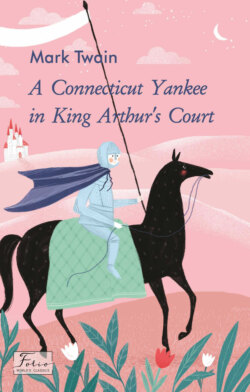A Connecticut Yankee in King Arthur’s Court

Реклама. ООО «ЛитРес», ИНН: 7719571260.
Оглавление
Марк Твен. A Connecticut Yankee in King Arthur’s Court
Preface
A word of explanation
HOW SIR LAUNCELOT SLEW TWO GIANTS, AND MADE A CASTLE FREE
The stranger’s history
The tale of the Lost land
Chapter I. Camelot
Chapter II. King Arthur’s Court
Chapter III. Knights of the Table Round
Chapter IV. Sir Dinadan the Humorist
Chapter V. An inspiration
Chapter VI. The Eclipse
Chapter VII. Merlin’s tower
Chapter VIII. The Boss
Chapter IX. The Tournament
Chapter X. Beginnings of Civilization
Chapter XI. The yankee in search of adventures
Chapter XII. Slow torture
Chapter XIII. Freemen
Chapter XIV “Defend thee, Lord”
Chapter XV. Sandy’s tale
Chapter XVI. Morgan le Fay
Chapter XVII. A royal banquet
Chapter XVIII. In the Queen’s Dungeons
Chapter XIX. Knight-Errantry as a trade
Chapter XX. The Ogre’s Castle
Chapter XXI. The pilgrims
Chapter XXII. The Holy Fountain
Chapter XXIII. Restoration of the Fountain
Chapter XXIV. A rival Magician
Chapter XXV. A competitive examination
Chapter XXVI. The first newspaper
Chapter XXVII. The Yankee and the King travel incognito
Chapter XXVIII. Drilling the king
Chapter XXIX. The Smallpox Hut
Chapter XXX. The tragedy of the Manor-house
Chapter XXXI. Marco
Chapter XXXII. Dowley’s humiliation
Chapter XXXIII. Sixth century political economy
Chapter XXXIV. The Yankee and the King sold as slaves
Chapter XXXV. A pitiful incident
Chapter XXXVI. An encounter in the dark
Chapter XXXVII. An awful predicament
Chapter XXXVIII. Sir Launcelot and knights to the rescue
Chapter XXXIX. The Yankee’s fight with the knights
Chapter XL. Three years later
Chapter XLI. The interdict
Chapter XLII. War!
Chapter XLIII. The battle of The Sand Belt
Chapter XLIV. A postscript by Clarence
Final P.S. by M.T
Отрывок из книги
The ungentle laws and customs touched upon in this tale are historical, and the episodes which are used to illustrate them are also historical. It is not pretended that these laws and customs existed in England in the sixth century; no, it is only pretended that inasmuch as they existed in the English and other civilizations of far later times, it is safe to consider that it is no libel upon the sixth century to suppose them to have been in practice in that day also. One is quite justified in inferring that whatever one of these laws or customs was lacking in that remote time, its place was competently filled by a worse one.
The question as to whether there is such a thing as divine right of kings is not settled in this book. It was found too difficult. That the executive head of a nation should be a person of lofty character and extraordinary ability, was manifest and indisputable; that none but the Deity could select that head unerringly, was also manifest and indisputable; that the Deity ought to make that selection, then, was likewise manifest and indisputable; consequently, that He does make it, as claimed, was an unavoidable deduction. I mean, until the author of this book encountered the Pompadour, and Lady Castlemaine, and some other executive heads of that kind; these were found so difficult to work into the scheme, that it was judged better to take the other tack in this book (which must be issued this fall), and then go into training and settle the question in another book. It is, of course, a thing which ought to be settled, and I am not going to have anything particular to do next winter anyway.
.....
That made an immense effect; up went appealing hands everywhere, and the king was assailed with a storm of supplications that I might be bought off at any price, and the calamity stayed. The king was eager to comply. He said:
“Name any terms, reverend sir, even to the halving of my kingdom; but banish this calamity, spare the sun!”
.....